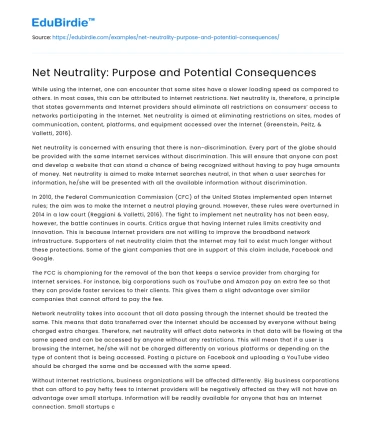While using the Internet, one can encounter that some sites have a slower loading speed as compared to others. In most cases, this can be attributed to Internet restrictions. Net neutrality is, therefore, a principle that states governments and Internet providers should eliminate all restrictions on consumers’ access to networks participating in the Internet. Net neutrality is aimed at eliminating restrictions on sites, modes of communication, content, platforms, and equipment accessed over the Internet (Greenstein, Peitz, & Valletti, 2016).
Net neutrality is concerned with ensuring that there is non-discrimination. Every part of the globe should be provided with the same Internet services without discrimination. This will ensure that anyone can post and develop a website that can stand a chance of being recognized without having to pay huge amounts of money. Net neutrality is aimed to make Internet searches neutral, in that when a user searches for information, he/she will be presented with all the available information without discrimination.
Save your time!
We can take care of your essay
- Proper editing and formatting
- Free revision, title page, and bibliography
- Flexible prices and money-back guarantee
In 2010, the Federal Communication Commission (CFC) of the United States implemented open Internet rules; the aim was to make the Internet a neutral playing ground. However, these rules were overturned in 2014 in a law court (Reggiani & Valletti, 2016). The fight to implement net neutrality has not been easy, however, the battle continues in courts. Critics argue that having Internet rules limits creativity and innovation. This is because Internet providers are not willing to improve the broadband network infrastructure. Supporters of net neutrality claim that the Internet may fail to exist much longer without these protections. Some of the giant companies that are in support of this claim include, Facebook and Google.
The FCC is championing for the removal of the ban that keeps a service provider from charging for Internet services. For instance, big corporations such as YouTube and Amazon pay an extra fee so that they can provide faster services to their clients. This gives them a slight advantage over similar companies that cannot afford to pay the fee.
Network neutrality takes into account that all data passing through the Internet should be treated the same. This means that data transferred over the Internet should be accessed by everyone without being charged extra charges. Therefore, net neutrality will affect data networks in that data will be flowing at the same speed and can be accessed by anyone without any restrictions. This will mean that if a user is browsing the Internet, he/she will not be charged differently on various platforms or depending on the type of content that is being accessed. Posting a picture on Facebook and uploading a YouTube video should be charged the same and be accessed with the same speed.
Without Internet restrictions, business organizations will be affected differently. Big business corporations that can afford to pay hefty fees to Internet providers will be negatively affected as they will not have an advantage over small startups. Information will be readily available for anyone that has an Internet connection. Small startups can be able to penetrate the Internet easily. With net neutrality, Internet providers act as gateways; they can make deals with big companies and block new competitions. Therefore, the lack of net neutrality restricts information of small business that cannot afford to pay for better services. Rising as a startup company will be much harder, however, with net neutrality, the Internet will be an open playground where the best wins. Net neutrality is, therefore, expected to promote IT efficiency in that everyone will have access to different amounts of information without any restrictions.






 Stuck on your essay?
Stuck on your essay?

